
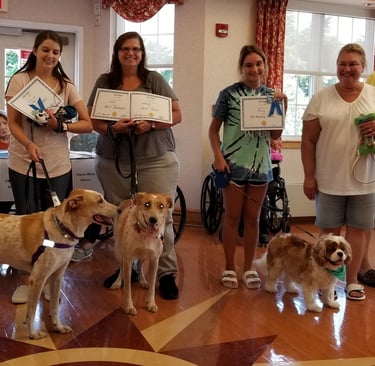
Therapy Dog Certification
Caring for a therapy dog demands a deep commitment and should not be a spontaneous decision. These dogs serve as more than just affectionate companions; they play a vital role in providing emotional support. To ensure a successful partnership, it is essential to create a peaceful home environment, establish a reliable routine, and allocate the necessary time, energy, and resources for their care and utilization as Therapy Dogs.
Before You Embark on this Remarkable Life Changing Journey of Healing a Commitment Is Needed
If you believe that both you and your cherished companion have the necessary qualities for this meaningful role, you are already on the right path. To have your dog recognized as a therapy animal, Compassionate Care Therapy Canines, Inc, (CCTC,) CCTC stipulates that the dog must be at least one year old. If your furry friend meets this age requirement, consider the steps you can take to embark on this rewarding journey together. Let’s delve into the essential qualifications that therapy dogs must meet.
Please Note: You can begin training your beloved pet before they turn one year old, which will give you a head start on the certification evaluation process to become a Therapy Dog Team. Starting early can help establish a strong foundation for your furry companion, making the journey toward certification smoother and more enjoyable for both of you.
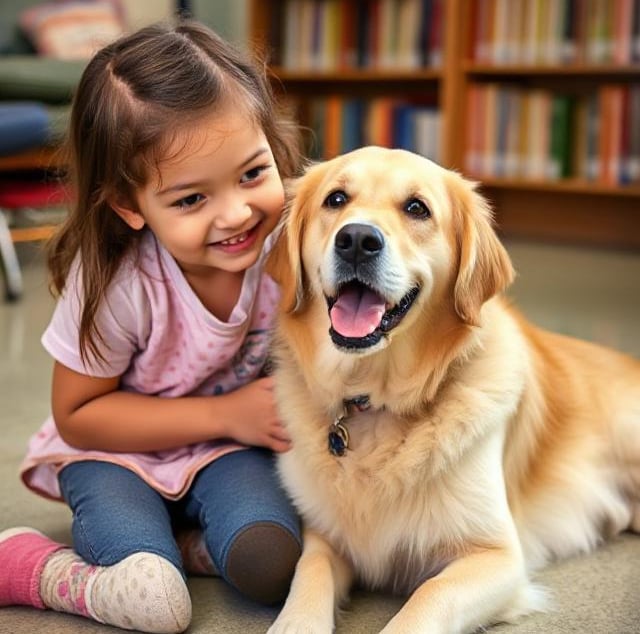

It is important to avoid raw diets due to potential contamination risks. To protect your dog's health and the well-being of those around them, regular de-worming and preventive care are crucial.
After submitting your volunteer application and completing the background check, you should enroll in the Humdog Canine Good Citizen Certification (CGC) once you receive background clearance.
Following your CGC certification, arrange for a physical examination and fecal test with your local veterinarian, which will involve a fee.
Once you have the veterinarian's certification and your dog successfully completes the Canine Good Citizen program, you will be eligible for the Compassionate Care Therapy Canines Therapy Team Certification.
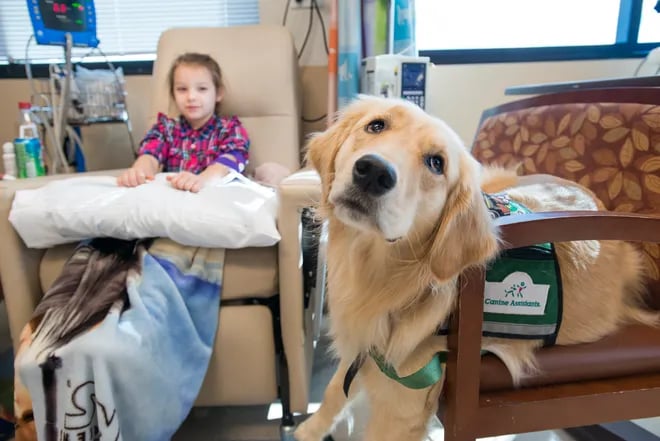

Introduction
Therapy dogs should have a calm and gentle nature, as those that exhibit anxiety or aggression are unable to provide the comfort needed by those they serve. The perfect therapy dog radiates tranquility and kindness, creating an environment filled with love and compassion. Beyond this soothing presence, there are additional important behavioral qualities that these extraordinary dogs must possess to truly thrive in their essential role:
- Welcoming and friendly with newcomers
- At ease around other pets and dogs
- Gentle and non-aggressive nature
- Low anxiety levels, including minimal separation anxiety
- Loves physical affection and snuggling
- Shows patience in various situations
- Obeys commands reliably
- Easily adjusts to new surroundings
- Sociable and friendly with others
- Stays calm in busy or stressful environments
Now that we have examined the key behaviors that contribute to a therapy dog's success, let's turn our attention to the health requirements that are vital for their overall well-being.
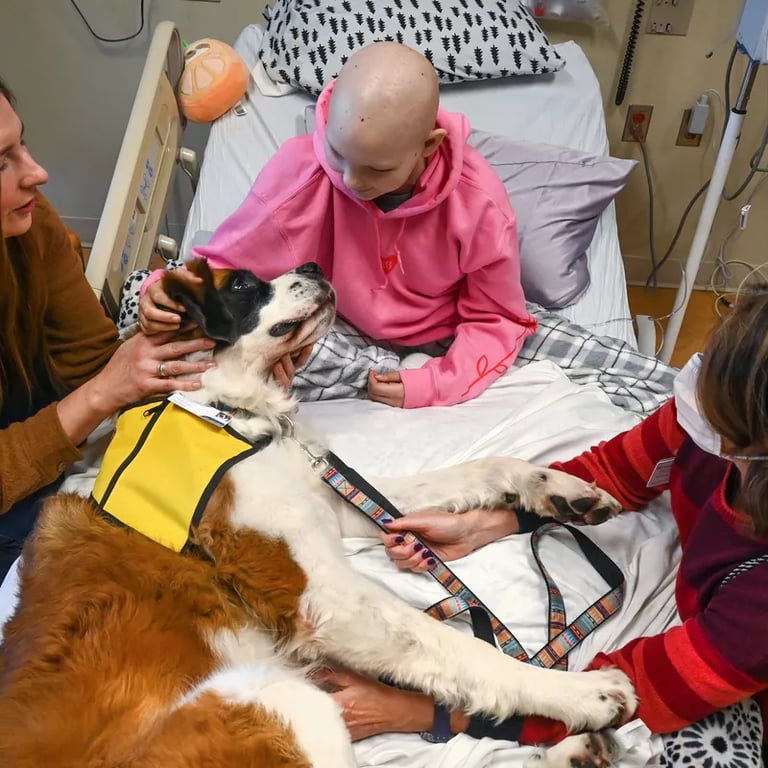

Behavioral Requirements
To achieve certification as a therapy dog, it is crucial to register and fulfill specific health and vaccination criteria. Keeping your dog's vaccination records current is vital, along with ensuring they are well-groomed and free from health concerns, which contributes to their safety and comfort in public environments.
It is important to avoid raw diets due to potential contamination risks. Ensuring your dog's health through regular de-worming and preventive care is crucial for their well-being and the safety of those they meet. After completing your background check, and cleared by CCTC. You will need to schedule a physical examination and fecal test with your local veterinarian, which will involve a fee. Once you receive the veterinarian's certification and your dog has successfully completed. Next schedule your dog in the Canine Good Citizen program.
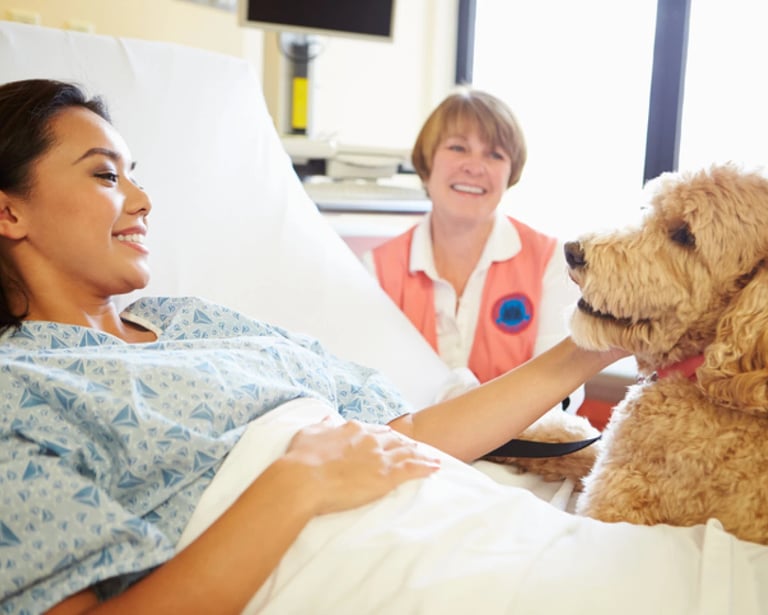

Health and Vaccination Requirements
Once you and your dog have fulfilled all the necessary behavior and health criteria, you can enroll in the Canine Good Citizen (CGC) program offered by Hum Dog. This program consists of a 10-skill test aimed at instilling essential traits in your dog that are characteristic of therapy animals, while also promoting responsible pet ownership for you as the handler. The focus is on practical skills that any dog can master, making it accessible for everyone who wishes to participate.
- Welcomes friendly strangers with ease and confidence
- Enjoys being petted while sitting calmly
- Allows gentle examination and brief grooming
- Can take a short walk on a loose leash
- Walks through public spaces without jumping
- Responds to cues by staying in place or sitting
- Comes promptly when called
- Interacts positively with other dogs
- Remains calm in the face of distractions or noise
- Waits patiently for the owner’s return without showing aggression
The CGC program certification comes with a fee that is necessary for you to progress toward becoming a certified Therapy Dog Team. Once you and your dog achieve certification as Compassionate Care Therapy Canines, Therapy Dog Team you will be reimbursed for the costs associated with your certification.
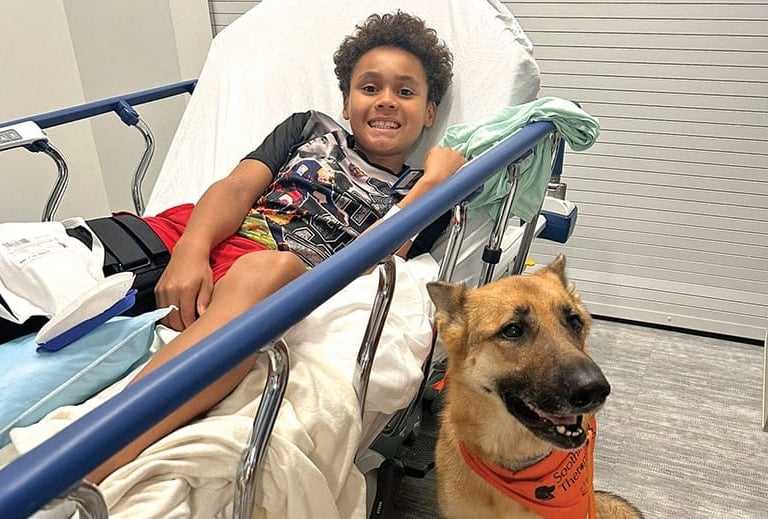

Canine Good Citizen (CGC)
Once you have fulfilled all the necessary criteria and obtained the Good Canine Citizen Certification, along with submitting the required documentation, we will proceed to register you for a Therapy Dog evaluation and certification with Compassionate Care Therapy Canine. Both you and your dog must successfully pass an assessment conducted by one of our evaluators to become a certified therapy dog team.
Upon achieving certification, you will receive an ID card featuring both of your photos, as well as a custom collar, harness, and leash for your beloved companion as well as a apron. To assist you in your new journey, we will provide a list of organizations that could benefit from your therapy dog services, including contact names and phone numbers to ease your access to their facilities, along with guidance on how to enter those locations.
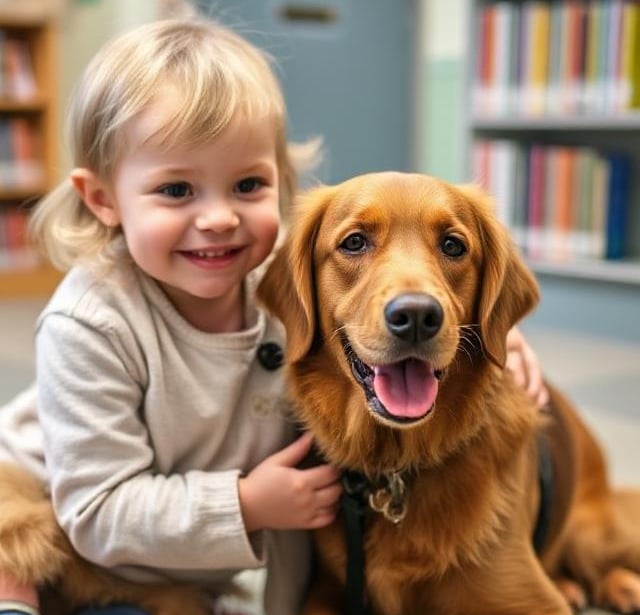

Certification as a Therapy Dog with Compassionate Care Therapy Canines
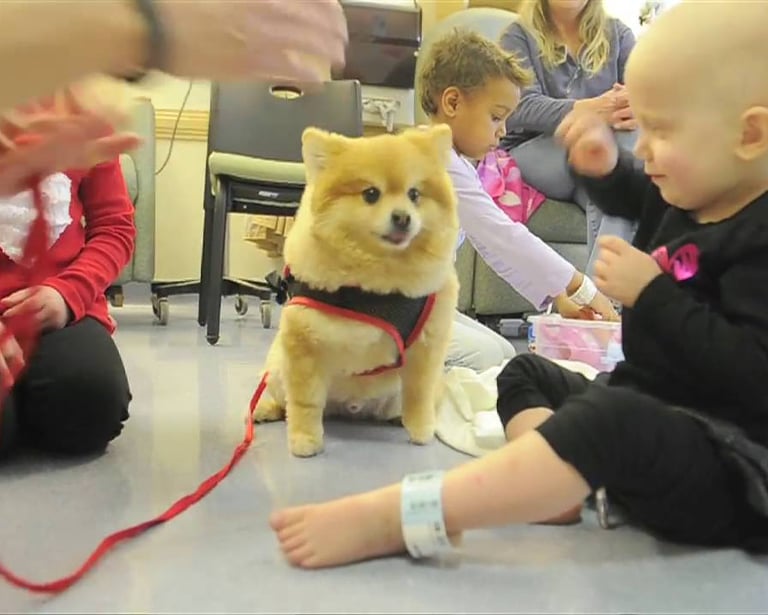

Guide to Next Steps After Certification Completion
Once you and your dog have successfully completed all physical, behavioral, and GCC Therapy Dog Certifications, please ensure that you fill out all required forms, including the physical and fecal clearance documents and certifications, along with any invoices you have.
You can submit these via email, mail, or in person, and we will gladly reimburse you for the costs associated with certifying you and your dog as a Therapy Team.
Additionally, we will provide you with a list of organizations that welcome CCTC Therapy Dogs to participate in their activities.
After receiving the list, we encourage you to reach out to these organizations to register and offer the compassionate support of your Therapy Canine where it is needed most.
Compassionate Care Therapy Canines Reimbursement
Once you have complete all the necessary requirements, including the Therapy Dog Team Certification you can submit your cost for the following for reimbursement:
Reimbursable Expenses
Our mission to provide therapy dogs across Humboldt County and nearby areas thrives thanks to the generous support of our wonderful donors. Their contributions are essential in training and certifying therapy dog teams dedicated to providing Comfort Care and Emotional Support for those in need.
CGC Certification: Completion of the CGC Certification is required. Please note that classes taken outside the initial certification process are not eligible for reimbursement, with the exception of the annual continued certification.
Dog Physical and Fecal Test: Ensure your dog is cleared by a veterinarian for the physical and fecal tests. All shots need to be current for your dog.
Handler Blood Work: For those interested in working in hospitals, a blood test is necessary. We will assist in scheduling your appointment in Eureka as well as cover the cost of the blood draw.
Equipment: We will provide you at no cost a dog collar, leach, a dog harness with CCTC logo which you can utilize when not performing essential Therapy Dog duties. Including grooming for your dog 4 times a year to meet CCTC dog grooming standards.
Once you have completed the Therapy Dog Certification process, please ensure that you submit all required invoices, veterinary certifications, and forms. We will provide you with a list of organizations that are eager to welcome a Therapy Dog Team.
It’s important to reach out to each organization to arrange appointments and meet their specific requirements before you begin your visits. Rest assured, you will be covered by our liability insurance while serving as a Therapy Dog Team.
Please Note: You are a volunteer and Not an employee of Compassionate Care Therapy Canines, Inc.
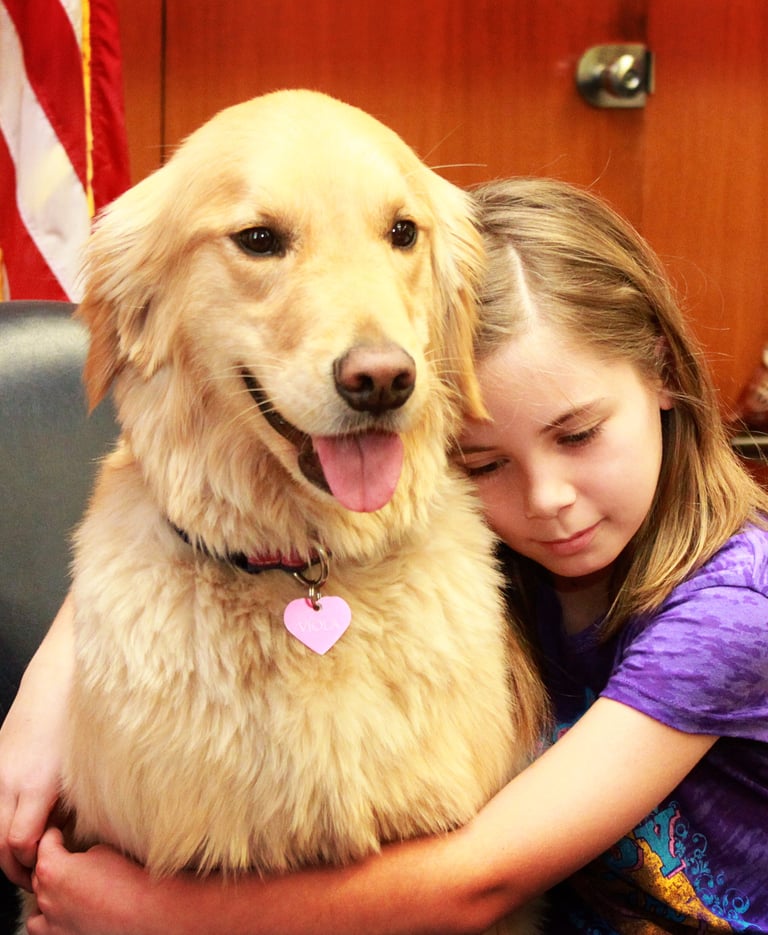

Welcome to the Compassionate Care Therapy Canine Family
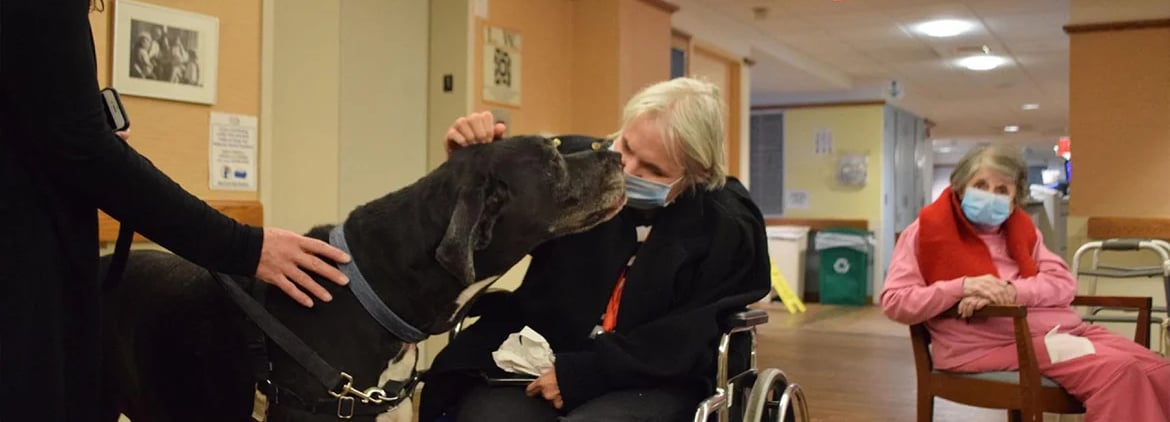

FAQs About Therapy Dogs and Qualifications
Many questions surround therapy dogs and their qualifications. Here are a few of the most asked questions.
How long does it take to train a therapy dog?
The time it takes to train a dog to be a therapy dog can vary. Some dogs may train quickly, while others may have behavior issues they must overcome first. However, a typical dog therapy training course is around eight weeks long through Humdog.org in Arcata.
Can any breed of dog become a therapy dog?
Yes! Any breed of dog can become a therapy dog. That said, some breeds tend to have a personality and temperament that works well for therapy. Golden retrievers, Labrador retrievers, Border Collies, and German shepherds make good therapy dogs as they are social and easy to train.
Are therapy dogs allowed in all public spaces?
As therapy dogs are not ESA or service dogs, they are only allowed in the public spaces where they are working as therapy dogs.
What happens if my dog doesn't pass the therapy dog certification test?
Many dogs don't pass the certification tests the first time. The CGC and most certification tests can be taken as often as needed. If you are dedicated to training your dog to be a therapy canine?
How do therapy dogs benefit mental health?
Being around therapy dogs helps release the feel-good chemicals dopamine and serotonin in the brain. Therapy dogs also help decrease the stress hormone cortisol.
What kind of temperament is required for a therapy dog?
A good therapy dog's temperament is loving, calm, patient, and genuine. They love human touch and contact.
How can I volunteer with my therapy dog in hospitals or schools?
At CCTC, we will provide you with a list of organizations seeking the support of a Therapy Dog Team after you complete your Therapy Dog Team Certification. You and your dog can then register as volunteers with one or more of these organizations. and you will be covered through our liability insurance during visits.
Can therapy dogs help with specific conditions like PTSD or depression?
Yes, studies have shown that therapy dogs can help to reduce symptoms for those who struggle with conditions like PTSD and depression.
What is the difference between a therapy dog certification and a service dog certification?
A service dog certification course involves complex and rigorous training to perform specific tasks depending on the disabilities that they assist with. On the other hand, therapy dog certification checks for basic obedience and staying calm around people or other animals.
The Path to Making a Difference with a Therapy Dog
Volunteering with a therapy dog in settings like hospitals, hospices, assisted living facilities, nursing homes, libraries, and schools can be an incredibly fulfilling experience. Imagine the joy you and your therapy dog can bring to a classroom full of children, filling their day with smiles and laughter. Picture the warmth of spending time with patients in a hospital, knowing that your presence has brightened their day, even if just for a moment.
If you have a dog and are interested in training it as a therapy dog, simply complete our background form and send it back to us via email or mail to embark on this meaningful journey together.
Therapy Dogs & Comfort Dogs - What Are They?
Therapy dogs and comfort dogs play vital roles in enhancing emotional and physical well-being. Therapy dogs undergo specialized training to provide psychological and physiological support, engaging with individuals in various settings such as hospitals, schools, and nursing homes.
Their presence fosters healing and comfort, and all donations received are dedicated to the education, training, and certification of these remarkable animals, ensuring that handlers incur no costs.
In contrast, comfort dogs, often referred to as emotional support dogs, are not specifically trained for therapeutic interventions but offer unwavering companionship and a soothing presence to their owners at home. While therapy dogs interact with a diverse range of people in public spaces, comfort dogs primarily focus on supporting their owners and do not possess the same access rights as service animals.
Compassionate Care Therapy Canines, Inc
A 501(3)(c) non-profit: EIN: 33-4426479
Phone: 707.497.7166
Email: therapycanines@yahoo.com
Mail: CCTC
POB 27
Trinidad, CA 95570
© 2025 by Compassionate Care Therapy Canines, Inc. All rights reserved.
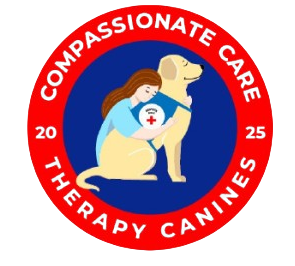

They Train. They Serve. They Heal.
At Compassionate Care Therapy Canines, Inc, our trained volunteers and certified therapy dogs are devoted to healing lives in our communities with programs designed to meet the unique needs of each person we serve using the mutually nurturing relationship between people and dogs.
